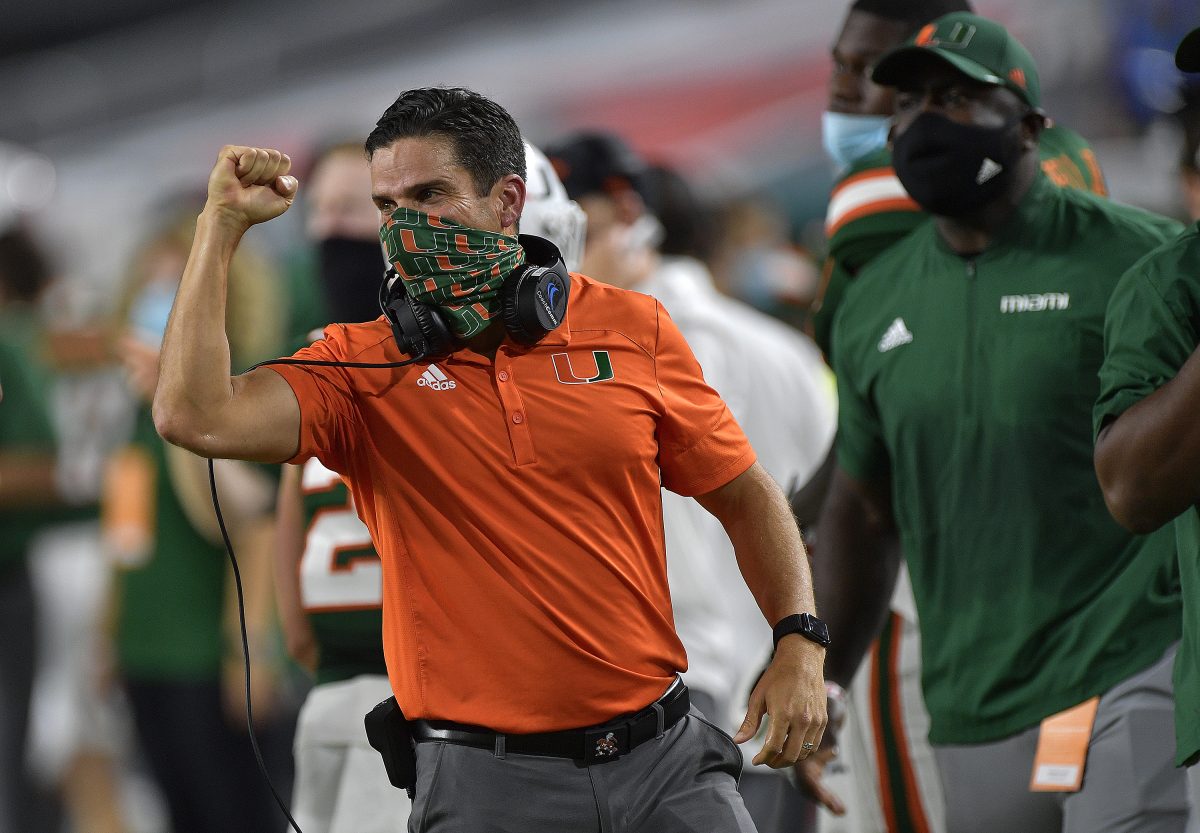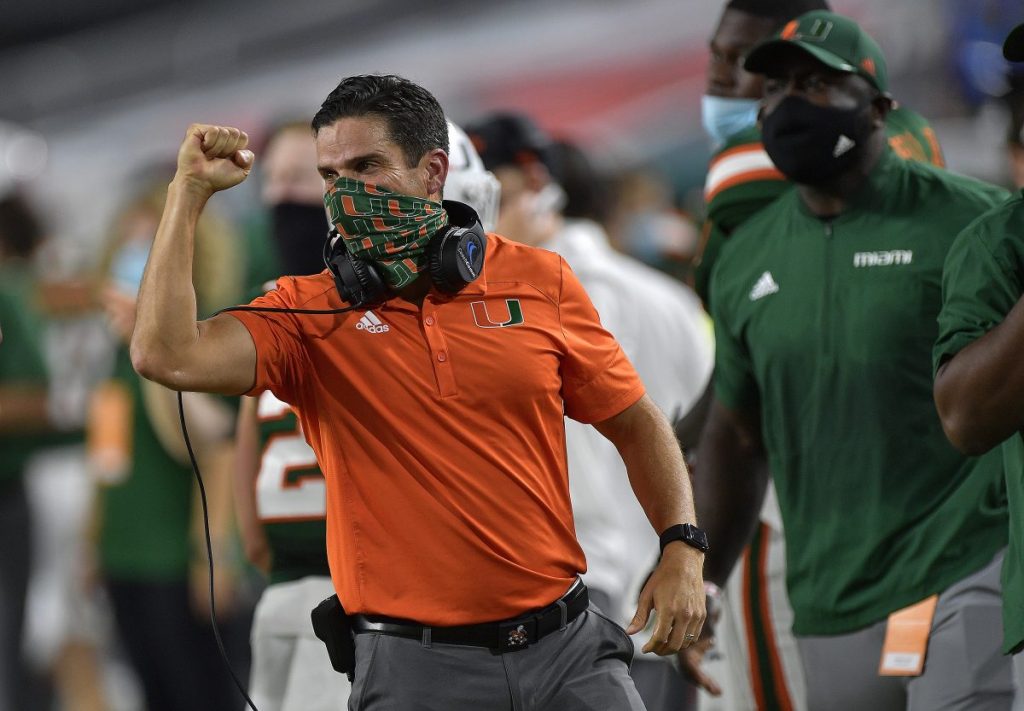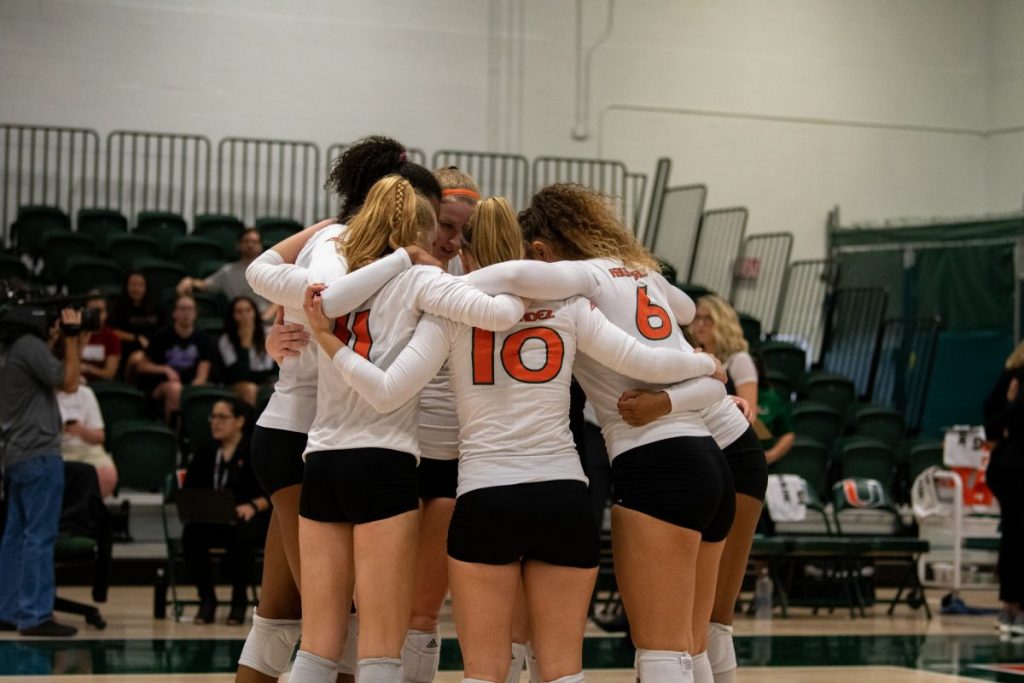
In the classroom, in training and in games, the fall semester was unlike any other for student athletes at the University of Miami and throughout the NCAA.
Back in June, long before classes had begun or the majority of students were welcomed back to campus, Miami’s football team resumed training, starting with 65 athletes, as others returned in phases throughout the summer. At that time, Florida had begun experiencing its first major spike of COVID-19 cases, and it was still unknown whether the ACC would have a fall football season.
The athletic department instituted various guidelines to ensure a safe return and prevent the spread of COVID-19 among athletes, coaches and athletic staff. These protocols included regular COVID-19 testing, contact-tracing, quarantine and isolation when necessary, daily temperature checks and screening before practices.

Miami’s football players were the first to put these protocols to the test.
Jaelan Phillips, a redshirt junior defensive lineman, returned to campus in July to begin training for the 2020 football season.
“We weren’t able to operate like we are used to,” Phillips said. “We have had limited access to the locker room, training room, and practice facilities. So, it has been challenging, to say the least.”
Phillips said he did not worry so much about contracting the virus.
“I am confident in the ACC protocols, and I believe that we are doing everything we can to be safe.”
UM’s athletic department did not make its COVID numbers public.
Once it was confirmed that the season would take place, Phillips said many doubted the team’s and the season’s success.
Miami had just come off a disappointing 2019 season where the Hurricanes went 6-7 and ended on a three-game losing streak. This included a gut-wrenching loss to Miami-Dade County rival Florida International University on the resting grounds of the Orange Bowl, the former stadium where the Miami football program saw some of its best years. The Canes topped off their season with a 14-0 loss to Louisiana Tech at the Independence Bowl.
Fortified by a young, new offensive coordinator, Brett Lashlee, and a new transfer starting quarterback, D’Eriq King, Miami faced a highly anticipated season, further complicated by the pandemic.
The team and Phillips proved many of the predictions wrong, said Phillips, who earned his first ACC Defensive Lineman of the Week honor this season.
“Many people thought that we wouldn’t get past four games,” he said. Miami, now 8-1 and ranked No. 10 in the country by the AP Top 25 Poll, had three College GameDays back to back this season and is a current contender for a shot at the ACC championship and a top bowl game.
More than halfway through the season, Miami faced its first major setback due to COVID-19.
Even though the team reportedly followed strict protocols, three games were postponed after an internal coronavirus outbreak, during which both head coach Manny Diaz and head trainer Vinny Scavo tested positive.
However, Miami came back from the three-week break with a resounding 48-0 victory over the Duke Blue Devils on Dec. 5.
Diaz said he is encouraged by how his team and the entire university handled every challenge that came their way this semester.
“We worked together tirelessly to ensure that we could operate safely during a pandemic,” Diaz said. “Many challenges still lie ahead, but I am confident we will continue to rise to meet them.”
Miami will end its season at home, facing University of North Carolina, ranked No. 17, on Saturday.
Miami’s volleyball team finishes a successful shortened season
In what may be the program’s best performance yet, the women’s volleyball team ended 5-3 and ranked No. 12 by the American Volleyball Coaches Association after an eight-game season shortened due to the pandemic.
“This semester was something completely different and new as an athlete,” said Emily Damon, a defensive specialist on the team. “The athletic department would be very cautious and test us three times a week during season.”

The volleyball team was still able to travel and competed in regional pods and two-game weekend series.
Toward the end of the season, a volleyball student tested positive for COVID-19, putting the whole team in quarantine for two weeks, said Damon, a junior public health major.
“At first I was terrified because I had just seen my parents who came in town to see our match,” Damon said. “But I ended up testing negative, and continued to quarantine for 14 days.”
Damon said the university did a great job of taking care of the volleyball athletes while they were in quarantine.
“I was getting three meals a day, sometimes it was even too much food,” Damon said. “I think I gained 5 pounds because I wasn’t working out either. But I am very grateful the university took good care of us; I felt safe at all times.”
Student athletes on UM’s COVID-19 protocol
Sydnee Roby, a center on the women’s basketball team, arrived on campus in July to begin preseason workouts with the women’s basketball team.
“There have been numerous changes since I got back to campus, and they’ve kept the number of cases lower than I expected them to be,” said Roby, a sophomore sports administration major. “But I’m still not comfortable with the numbers that have been posted.”
UM reports more than 1,500 confirmed cases of COVID-19 since Aug. 16, which includes positive tests for students, faculty and staff.
Roby, complimented the university’s and the athletics department’s efforts to keep students safe.
“The school has done a fairly good job with regulations and protocols,” said Roby. “And the athletic department has really been keeping an eye on us as athletes to make sure we do our part in keeping numbers down.”
Selena Fortich, a defender on UM’s women’s soccer team, said she was glad UM gave students the option to complete the semester remotely.
“I think administrators did well in giving students the option to stay at home and do classes on Zoom if they felt uncomfortable, but also provided an option for those who did want in-person classes,” said Fortich, a senior political science and criminology double major. However, with the hybrid format in which some students could attend class remotely, attendance became more flexible for in-person classes, she said.
“Not every class was held to the same standard,” Fortich said. “I felt like some classes were more lenient in terms of showing up on the day you were assigned to be on campus compared to others that were stricter about it.”
Andrew Barnes, a redshirt freshman safety on the football team, said despite the number of COVID-19 cases, the university was able to successfully remain open and keep outbreaks at a minimum.
“I feel more safe on campus than being at home in my community,” Barnes said.
Barnes said he thinks fewer students will opt to be on campus in the spring because of the impact of COVID-19.
“The whole point of college is to get the college experience, but because of COVID-19, students aren’t getting that true experience, so it’s no real reason to be here. You can earn your grades from home,” Barnes said.
Althea Castro, Jarius Howard, Brianna Jackson, Dante Johnson and Morgan Ledenko contributed to the reporting of this story.





